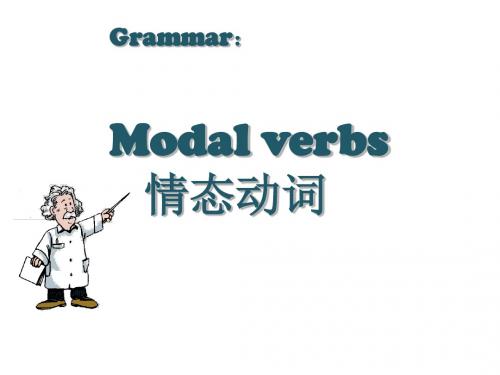情态动词公开课ppt
合集下载
情态动词讲解ppt课件

A. may B. might C. could
D. must
10
may, might, can, could
表示猜测
➢ 1. They (can/might) ___m__ig_h__t___be away for the
weekend but I’m not sure.
表示许可
➢ 2. You (may/might) __m__a_y_____leave now if you
1.A computer ____ think for itself; it must be told what to do.
A. can’t B. couldn’t C. may not D. might not
1.I thought you ________ like something to read, so I have brought you some books.
2.表示推测时,could不是过去式,只是语气 更委婉;若是推测已发生的事或过去的情况, 用can/could have done
7
3.can和be able to辨析 can(could)和be able to都可以表示能力,意思上没有区别。 但can只有现在式和过去式,而be able to则有更多的形式。 如:
3
Ⅲ 情态动词的语法特征 1) 情态动词不能表示正在发生或已经
发生的事情,只表示期待或估计某事的 发生。
2) 情态动词除ought 和have 外,后 面只能接动词原形。
3) 情态动词没有人称,数的变化,即 情态动词第三人称单数不加-s。
4) 情态动词没有非谓语形式,即没有 不定式,分词,等形式。
1.It may rain this afternoon. 2.She might come to join us this afternoon. 3.I suppose he might have missed the train.
情态动词(20张PPT)初中英语专项复习课件

看法。
(1)只作情态动词:must;can/could;may/might;ought to
(2)既可作情态动词又可作实义动词:need,dare
((34))既 具可 有作 情情 态态 动动词词某又些可特作征稿稿定助:定hPa动PPvTP,e词T/海h:量asd素ha材tlo持l;/s续hha更odublde;twteirll/would
【知识拓展】
1. must的一般疑问句,肯定回答为Yes, ...must.;否定回答为No, ...needn’t./No, ...don’t have
to.—Must I clean the classroom now? 我必须现在打扫教室吗?
—Yes, you must. 是的,你必须。/No, you don’t have to. /No, you needn’t. 不,你不必。
He promised he would never smoke again. 他承诺他再也不吸烟了。
Their English teacher would tell them stories in
表示过去反复发生的动 English after class.
作或某种倾向
他们的英语老师总是在课后用英语给他们讲故事
新,上千款模板选择总有一
款适合你
知识点二:情态动词的特点
情态动词的特点: (1)情态动词无人称和数的变化(have to除外); (2)情态动词后接动词原形; (3)情态动词的否定式是在其后加not; have to除外 (4)具有助动词的作用,可用来构成否定句、疑问句及用于简明答语; (5)个别情态动词有现在式和稿过定去PP式T两种形式,过去式用来表达更加客气、委 婉的语气,时态性不强,可稿用定于PPT过,海去量、素材现持在续更或将来。
(1)只作情态动词:must;can/could;may/might;ought to
(2)既可作情态动词又可作实义动词:need,dare
((34))既 具可 有作 情情 态态 动动词词某又些可特作征稿稿定助:定hPa动PPvTP,e词T/海h:量asd素ha材tlo持l;/s续hha更odublde;twteirll/would
【知识拓展】
1. must的一般疑问句,肯定回答为Yes, ...must.;否定回答为No, ...needn’t./No, ...don’t have
to.—Must I clean the classroom now? 我必须现在打扫教室吗?
—Yes, you must. 是的,你必须。/No, you don’t have to. /No, you needn’t. 不,你不必。
He promised he would never smoke again. 他承诺他再也不吸烟了。
Their English teacher would tell them stories in
表示过去反复发生的动 English after class.
作或某种倾向
他们的英语老师总是在课后用英语给他们讲故事
新,上千款模板选择总有一
款适合你
知识点二:情态动词的特点
情态动词的特点: (1)情态动词无人称和数的变化(have to除外); (2)情态动词后接动词原形; (3)情态动词的否定式是在其后加not; have to除外 (4)具有助动词的作用,可用来构成否定句、疑问句及用于简明答语; (5)个别情态动词有现在式和稿过定去PP式T两种形式,过去式用来表达更加客气、委 婉的语气,时态性不强,可稿用定于PPT过,海去量、素材现持在续更或将来。
情态动词讲解精ppt课件

例句
will/would
详细描述:will 表示现在的意愿或 预测,would 表示过去的或虚拟 的意愿或预测。
1. I will help you with your project.(我会帮助你完成你的项 目。)
总结词:表示意愿或预测
例句
2. They would have gone to the party if they had known about it earlier.(如果他们早点 知道,他们就会去参加聚会。)
表示意愿
情态动词+动词原形,如 would like to go,表示 某人想要去。
形式变化
基本形式
情态动词的基本形式包括 现在时、过去时和将来时 。
过去式
情态动词的过去式通常是 在基本形式后面加-d或ed,如could have done 、should have done等。
将来时
情态动词的将来时通常是 在基本形式后面加-will或shall,如will be able to 、shall have to等。
may与might的区别与联系
总结词
may表示现在的许可或可能性;might表示过去的可能性或许可。
详细描述
may用于肯定句中,表示许可或可能性,例如“You may use this room.”(你可以使用这个房间。 )“The book may be in the library.”(这本书可能在图书馆里。)might表示过去的可能性,常 用于过去时态的句子中,例如“He might come tomorrow.”(他明天可能来。)
未必、很难说
She might not agree with us.
表示虚拟语气
will/would
详细描述:will 表示现在的意愿或 预测,would 表示过去的或虚拟 的意愿或预测。
1. I will help you with your project.(我会帮助你完成你的项 目。)
总结词:表示意愿或预测
例句
2. They would have gone to the party if they had known about it earlier.(如果他们早点 知道,他们就会去参加聚会。)
表示意愿
情态动词+动词原形,如 would like to go,表示 某人想要去。
形式变化
基本形式
情态动词的基本形式包括 现在时、过去时和将来时 。
过去式
情态动词的过去式通常是 在基本形式后面加-d或ed,如could have done 、should have done等。
将来时
情态动词的将来时通常是 在基本形式后面加-will或shall,如will be able to 、shall have to等。
may与might的区别与联系
总结词
may表示现在的许可或可能性;might表示过去的可能性或许可。
详细描述
may用于肯定句中,表示许可或可能性,例如“You may use this room.”(你可以使用这个房间。 )“The book may be in the library.”(这本书可能在图书馆里。)might表示过去的可能性,常 用于过去时态的句子中,例如“He might come tomorrow.”(他明天可能来。)
未必、很难说
She might not agree with us.
表示虚拟语气
情态动词专题知识公开课获奖课件

第7页
②在予以他人许可时,常用can,但有时也用may。不能用 might。
-May I play basketball this afternoon? 今天下午我可以打篮球吗? -Yes,you may. 行,可以。
第8页
(2)表达也许性 may和might表达也许性时,可以对目前、过去或未来进行 推测。 Peter may e with us tonight,but he isn't sure yet. 彼得今晚也许和我们一起来,但他还没确定。 He might be studying in the classroom. 他也许正在教室里学习。
用于必定句,表示对
taken the other road.It might have
过去没有做某事遗憾,意思 been quicker.可能我们本应走另一
should/ou 为“原来能够……(但实际 条路,那样可能更加快些。
第17页
(3)用于法律、公约、约定等正式条文,重要用于第三人称。 Students shall remain in their seats until all the papers have been collected. 试卷所有收回后学生方可离开座位。
第18页
5. will和would使用措施 作情态动词will,would与作助动词will,would多种形式相 似。 (1)表达自愿做或积极提出做什么,如意志、愿望或决心等。 would用于过去状况。
第14页
The TV set is broken. I have to buy a new one. 电视机坏了。我不得不再买台新。 The students will have to know how to use the puters. 学生将必须理解怎样使用电脑。 He had to go,because his mother was ill. 他不得不离开,由于他母亲病了。
②在予以他人许可时,常用can,但有时也用may。不能用 might。
-May I play basketball this afternoon? 今天下午我可以打篮球吗? -Yes,you may. 行,可以。
第8页
(2)表达也许性 may和might表达也许性时,可以对目前、过去或未来进行 推测。 Peter may e with us tonight,but he isn't sure yet. 彼得今晚也许和我们一起来,但他还没确定。 He might be studying in the classroom. 他也许正在教室里学习。
用于必定句,表示对
taken the other road.It might have
过去没有做某事遗憾,意思 been quicker.可能我们本应走另一
should/ou 为“原来能够……(但实际 条路,那样可能更加快些。
第17页
(3)用于法律、公约、约定等正式条文,重要用于第三人称。 Students shall remain in their seats until all the papers have been collected. 试卷所有收回后学生方可离开座位。
第18页
5. will和would使用措施 作情态动词will,would与作助动词will,would多种形式相 似。 (1)表达自愿做或积极提出做什么,如意志、愿望或决心等。 would用于过去状况。
第14页
The TV set is broken. I have to buy a new one. 电视机坏了。我不得不再买台新。 The students will have to know how to use the puters. 学生将必须理解怎样使用电脑。 He had to go,because his mother was ill. 他不得不离开,由于他母亲病了。
情态动词ppt课件市公开课获奖课件省名师示范课获奖课件

I don’t like this TV set. We must buy a new one. There was no more bus. They had to walk home.
• (2) must旳否定形式mustn’t表达禁止, 意思是“不能,不许”。例如:
• (2023上海春)When I was young, I was told that I ______ play with matches
B. it is used to
• C. it was used to
D. it used to be
• 【答案】A D
(三)情态动词+have done
• must表达对某人某事旳猜测;对过去发生旳 事情作肯定判断用must have done
There is nobody here. They must have all gone home.
• can用于肯定句中表达一种理论上旳可能性, 并不牵涉是否真旳会发生;
• The road can be blocked. • could用于肯定句中,语气比can更弱。
• (4)may (not) / might (not)体现一种不太把 握旳推测,意为“或许,可能”;might旳 语气比may较婉转.
• A. might B. should C. could D. would
• 【答案】D
• (2) would表达过去倾向性或习惯性旳动作。 used to 也有这一使用方法,但used to即 可用来体现过去旳习惯性旳动作,也可用 来表达过去旳状态。例如:
• ① (NMET1996上海)When he was there, he ___ go to that coffee shop at the corner after work every day.
• (2) must旳否定形式mustn’t表达禁止, 意思是“不能,不许”。例如:
• (2023上海春)When I was young, I was told that I ______ play with matches
B. it is used to
• C. it was used to
D. it used to be
• 【答案】A D
(三)情态动词+have done
• must表达对某人某事旳猜测;对过去发生旳 事情作肯定判断用must have done
There is nobody here. They must have all gone home.
• can用于肯定句中表达一种理论上旳可能性, 并不牵涉是否真旳会发生;
• The road can be blocked. • could用于肯定句中,语气比can更弱。
• (4)may (not) / might (not)体现一种不太把 握旳推测,意为“或许,可能”;might旳 语气比may较婉转.
• A. might B. should C. could D. would
• 【答案】D
• (2) would表达过去倾向性或习惯性旳动作。 used to 也有这一使用方法,但used to即 可用来体现过去旳习惯性旳动作,也可用 来表达过去旳状态。例如:
• ① (NMET1996上海)When he was there, he ___ go to that coffee shop at the corner after work every day.
情态动词语法讲解PPT课件

2表示“许可”和“不许”
a)请求对方“许可”可用can, could, may, might.
may/might较正式,could/might较委婉
表示给予“许可”通常用can/may,而不用 could/might
Could I use your phone? Yes, of course you can. Might I trouble you for a light? You may indeed.
表示将来的“必须”,常用have to的一定 形式(will/shall have to) 比较:
•We must do it again.(表示现在)
•We’ll have to do it again.(表示将来)
•表示过去的“必须”,常用had to
•I had to leave at six yesterday.
•They must be home by now.(他们现在一定到家了)
will/would表示“推测”可有三种情况
1)对特定事态的推测
A: Who’s that man over there? B: That will be George, no doubt. C: That would be George, I except.
• Can they have missed the bus?
• Yes, they may have.
may not重音落在助动词上,表示 “不可能”,重音落在否定词上,表 示“不许可” , 比较:
•He may not go tomorrow.
•He may not go tomorrow.
•所以在书面语中,表示“不可能” 常用can’t
情态动词全部ppt课件

A.must
B.would
C.should
D.might
19
• 翻译 • ----我能在这个房间抽烟吗? .
---- 可以。 ---- 不行,… ----Might/ May I smoke in this room?
---- Yes, you can.
---- No, you mustn’t
20
rule.
(威胁)
26
Shall 决心、承诺、警告、命令 you \he\she\they shall…..(二三人称陈述)
When the chairman turns up, nobody shall say a word. 命令 Students shall remain in their seats until the papers have been
28
5. should
1. should表示义务、职责、劝告,意 为 “应该”。
eg: You should keep your promise. Students should respect teachers.
29
2)表示说话人_惊_讶______等特殊情感。
It’s surprising that Mary should not know Lei Feng.
3.must, need没有时态,但有些情态动词如can、 may,will,have to有一般式和过去式的变化。
4. 情态动词不能单独做谓语,必须和实义动词原形 一起构成谓语。
3
情态动词的“时态”形式并不是时间区 别的 主要标志, 不少情况下, 情态动词的 现在式 形式和过去式形式都可用来表 示现在时 间、过去时间和将来时间。
《英语情态动词》PPT课件

(12) You can't be too careful while driving. 开车时越小心越好。
【结论6】 cannot ... too/enough表示“无论……也不过 分”;“越……越好”。用来加强语气。 (13) I couldn't but choose to wait.
【结论7】cannot but do sth. 不得不;只好 (14) They were able to put out the fire without any help from the firefighters.
(8) Can it be true? (9) You can't be serious! (10) Oh, dear, what on earth can this mean? (11) How could you do such a silly thing? 你怎么能做那样的蠢事呢? 【结论5】表示惊讶、怀疑、不相信的态度,常用在否 定句、疑问句和感叹句中。
(3)表示“偏执”,“固执” “偏要、硬要” 。 — How old are you, madam? — If you must know, I'm twice my son's age. Don't interrupt me, John. Must you force me to tell you the truth at the moment?
A computer can’t think for itself; it must be told what to do.(一般能力) 句意为:对绝大多数受到威胁时而不能起身逃跑的植物 He is a native speaker of English, so he can of course 来说,最大的问题是动物喜欢吃它们。情态动词can 可 speak English quite well.(一般能力) 表示对能力的否定。 I以表示人的能力和物的性能,故选 am starving to death. I can eat twoB bowls of rice now. (现在的能力) The biggest problem for most plants, which ___just get up and run away when threatened, is that animals like to eat them.(07湖南) A. shan’t B. B can’t C. needn’t D. mustn’t
- 1、下载文档前请自行甄别文档内容的完整性,平台不提供额外的编辑、内容补充、找答案等附加服务。
- 2、"仅部分预览"的文档,不可在线预览部分如存在完整性等问题,可反馈申请退款(可完整预览的文档不适用该条件!)。
- 3、如文档侵犯您的权益,请联系客服反馈,我们会尽快为您处理(人工客服工作时间:9:00-18:30)。
1.A big fire broke out in ABC hotel yesterday. Luckily, everyone was able to run out of __________ the building. 2. She speak both English and French.
can _____
advisability ought to/should have to
necessity
must
Your mother brings you up and takes good care of you, so when she is old, you ___ look after her in return.
shall: 2.Shall用于第二、第三人称,表 示说话人给对方命令、警告、允 诺或威胁。
7.Making offers (提供帮助):
Mom, my dirty clothes have been piled up! I don’t have time……
Don’t worry, dear, I will wash them right away.
just called me from his home 15 seconds ago.
A.may B.might C.must
must
1. must 表示肯定的猜测,译为“一定”, 不能用于否定句或疑问句。 This must be your pen. He must be doing his homework now. He must have arrived already.
can/could:
2.在疑问句中,用could可表示请 求,语气较委婉。
He asks if he could ____ smoke here.
— Could ____I have the television on? can/may — Yes, you _____. / No, you _____ can’t/I’m afraid not
1.Shall we begin our lesson?
2.When shall he be allowed to leave hospital?
3.Shall I carry this bag for you?
You shall fail if you don‘t work harder. 警告 He shall be punished according to the rule. 威胁 允诺 He shall have the book when I finish it. 等我读完这本书,就会给他的。
may/might:
1. 表示许可。表示请求、允许时, might比may的语气更委婉一些。
— Might/May I use your computer? — Yes, you can. /No, you can’t/mustn’t.
may/might: 2.用于祈使句中表示祝愿。 May you be happy all your life. May you succeed. 祝你成功!
The door won’t 2). 门就是打不开 ! open.
will/would:
Question: Is this sentence correct? Why?
I will go to the park with you tomorrow if you will offer me lunch. 情态动词
3.表示推测、可能(只用于肯定句, 疑问句则要用can或could)。 He may be very busy now.
5.Making requests (提出要求):
informal
will can could
formal
would
I don’t know how to use this equipment!
will/would:
1).The old man would _______have a smoke under a big tree every afternoon after he finished his farm work.
3.可表示经常性、习惯性、倾向 性。翻译为“经常、惯于、总 是”。
Can you help me with my training?
6.Making suggestions (提出建议):
It’s too hot to take exercise in the afternoon.
Shall we do the training in the morning?
shall: 1.Shall用于第一、第三人称疑问 句中,表示说话人征求对方的意 见、向对方请示或提供帮助 。
3.常以needn’t 和daren’t (sth.) need doing 的形式出现;
4.dare有其过去时dared.
must
2. 表示“坚持”(常用于固定句型:if you must do sth. 如果你非得要做某事)
如果你真的要走,那就悄悄离开。
If you must leave, do it quietly.
—They___ be doing the experiment in the lab. —Why? —Because the lights are still burning.Байду номын сангаасA.could C.must B.can D.would
can/could:
3.表示惊异、怀疑、不相信的态度。(主 要用在否定句、疑问句或惊叹句中)
Can this be true?
He’s such a nice person that can’t commit the crime. he ______
How can you be so careless! 你怎么会如此地粗心!
C. must not hurry
D. needn’t have hurried
Practice
3. –I saw Mary in the library yesterday. --You_____ her. She is still abroad. A. mustn’t see B. can’t have seen C. mustn’t have seen D. couldn’t see 4. Aunt Mary______the train, otherwise she would have arrived here by now. A. must have missed B. should have missed C. had missed D. might miss
2.情态动词should用于第一人称 时可以表示说话人的一种谦逊、 客气、委婉的语气。
Rose—Sure. By the way, who is your idol? Jack—Liu Xiang, I should say. I should advise you not to do that again.
• ---When can I come for the photos ? I need them tomorrow afternoon. ---They _____be ready by 12 : 00 . A. can B. should C. might D. need
(1)must have done对过去某事的十分肯定猜测 (2)may/might have done对过去某事的可能性 猜测 (3)can’t/couldn’t have done对过去某事的否定 猜测 (4)should/ought to have done过去应该做而未 做 (5)shouldn’t/oughtn’t to have done 过去不应该做而实际上做了 (6)needn’t have done 本没有必要做的事实际 却做了 (7)could have done 本来能够做的(有能力做)事实际却未做到
can/could: 4. can never/can’t……too表示 “无论怎样…也不过分”,“越…越 好” 。 You can’t be too careful 你过马路的时候再小心也不为过。
while crossing the road.
can/be able to区别:
Edison always wondered why hens could hatch (孵) chickens while he was not able to.
四. 可兼做行为动词的情态动词:need 、 dare
情态动词 (+动词原形) 行为动词 1.无人称和数的变化; 多用于肯定句; 2.尤其用于: need *否定句及疑问句中; (sb.) need to do *在if/whether之后; dare to do *或与hardly, never, (sth.) need to be no one, nobody连用; done dare
三. “情态动词+have done”的用法
Practice
1.With so much work on hand, you ____to see the game last night. A. mustn’t go B. could have gone C. shouldn’t go D. shouldn’t have gone 2. There was plenty of time. She ____. A. mustn’t have hurried B. couldn’t have hurried
A.can B.may C.have to D.must
very uncertain
might may could (can) should
can _____
advisability ought to/should have to
necessity
must
Your mother brings you up and takes good care of you, so when she is old, you ___ look after her in return.
shall: 2.Shall用于第二、第三人称,表 示说话人给对方命令、警告、允 诺或威胁。
7.Making offers (提供帮助):
Mom, my dirty clothes have been piled up! I don’t have time……
Don’t worry, dear, I will wash them right away.
just called me from his home 15 seconds ago.
A.may B.might C.must
must
1. must 表示肯定的猜测,译为“一定”, 不能用于否定句或疑问句。 This must be your pen. He must be doing his homework now. He must have arrived already.
can/could:
2.在疑问句中,用could可表示请 求,语气较委婉。
He asks if he could ____ smoke here.
— Could ____I have the television on? can/may — Yes, you _____. / No, you _____ can’t/I’m afraid not
1.Shall we begin our lesson?
2.When shall he be allowed to leave hospital?
3.Shall I carry this bag for you?
You shall fail if you don‘t work harder. 警告 He shall be punished according to the rule. 威胁 允诺 He shall have the book when I finish it. 等我读完这本书,就会给他的。
may/might:
1. 表示许可。表示请求、允许时, might比may的语气更委婉一些。
— Might/May I use your computer? — Yes, you can. /No, you can’t/mustn’t.
may/might: 2.用于祈使句中表示祝愿。 May you be happy all your life. May you succeed. 祝你成功!
The door won’t 2). 门就是打不开 ! open.
will/would:
Question: Is this sentence correct? Why?
I will go to the park with you tomorrow if you will offer me lunch. 情态动词
3.表示推测、可能(只用于肯定句, 疑问句则要用can或could)。 He may be very busy now.
5.Making requests (提出要求):
informal
will can could
formal
would
I don’t know how to use this equipment!
will/would:
1).The old man would _______have a smoke under a big tree every afternoon after he finished his farm work.
3.可表示经常性、习惯性、倾向 性。翻译为“经常、惯于、总 是”。
Can you help me with my training?
6.Making suggestions (提出建议):
It’s too hot to take exercise in the afternoon.
Shall we do the training in the morning?
shall: 1.Shall用于第一、第三人称疑问 句中,表示说话人征求对方的意 见、向对方请示或提供帮助 。
3.常以needn’t 和daren’t (sth.) need doing 的形式出现;
4.dare有其过去时dared.
must
2. 表示“坚持”(常用于固定句型:if you must do sth. 如果你非得要做某事)
如果你真的要走,那就悄悄离开。
If you must leave, do it quietly.
—They___ be doing the experiment in the lab. —Why? —Because the lights are still burning.Байду номын сангаасA.could C.must B.can D.would
can/could:
3.表示惊异、怀疑、不相信的态度。(主 要用在否定句、疑问句或惊叹句中)
Can this be true?
He’s such a nice person that can’t commit the crime. he ______
How can you be so careless! 你怎么会如此地粗心!
C. must not hurry
D. needn’t have hurried
Practice
3. –I saw Mary in the library yesterday. --You_____ her. She is still abroad. A. mustn’t see B. can’t have seen C. mustn’t have seen D. couldn’t see 4. Aunt Mary______the train, otherwise she would have arrived here by now. A. must have missed B. should have missed C. had missed D. might miss
2.情态动词should用于第一人称 时可以表示说话人的一种谦逊、 客气、委婉的语气。
Rose—Sure. By the way, who is your idol? Jack—Liu Xiang, I should say. I should advise you not to do that again.
• ---When can I come for the photos ? I need them tomorrow afternoon. ---They _____be ready by 12 : 00 . A. can B. should C. might D. need
(1)must have done对过去某事的十分肯定猜测 (2)may/might have done对过去某事的可能性 猜测 (3)can’t/couldn’t have done对过去某事的否定 猜测 (4)should/ought to have done过去应该做而未 做 (5)shouldn’t/oughtn’t to have done 过去不应该做而实际上做了 (6)needn’t have done 本没有必要做的事实际 却做了 (7)could have done 本来能够做的(有能力做)事实际却未做到
can/could: 4. can never/can’t……too表示 “无论怎样…也不过分”,“越…越 好” 。 You can’t be too careful 你过马路的时候再小心也不为过。
while crossing the road.
can/be able to区别:
Edison always wondered why hens could hatch (孵) chickens while he was not able to.
四. 可兼做行为动词的情态动词:need 、 dare
情态动词 (+动词原形) 行为动词 1.无人称和数的变化; 多用于肯定句; 2.尤其用于: need *否定句及疑问句中; (sb.) need to do *在if/whether之后; dare to do *或与hardly, never, (sth.) need to be no one, nobody连用; done dare
三. “情态动词+have done”的用法
Practice
1.With so much work on hand, you ____to see the game last night. A. mustn’t go B. could have gone C. shouldn’t go D. shouldn’t have gone 2. There was plenty of time. She ____. A. mustn’t have hurried B. couldn’t have hurried
A.can B.may C.have to D.must
very uncertain
might may could (can) should
